 Technology peripherals
Technology peripherals
 AI
AI
 Generate a Marvel 3D digital human in five minutes! The American Spider-Man and the Joker can all do it, and the facial details are restored in high definition.
Generate a Marvel 3D digital human in five minutes! The American Spider-Man and the Joker can all do it, and the facial details are restored in high definition.
Generate a Marvel 3D digital human in five minutes! The American Spider-Man and the Joker can all do it, and the facial details are restored in high definition.
With the development of computer graphics, 3D generation technology is gradually becoming a research hotspot. However, there are still many challenges in generating 3D models from text or images.
Recently, companies such as Google, NVIDIA, and Microsoft have launched 3D generation methods based on neural radiation fields (NeRF), but these methods are compatible with traditional 3D rendering software (such as Unity, Unreal Engine, Maya, etc.) Sexual issues limit its wide application in practical applications.
To this end, the R&D team of Yingmo Technology and ShanghaiTech University proposed a text-guided progressive 3D generation framework designed to solve these problems.
Generate 3D assets based on text descriptions
The text-guided progressive 3D generation framework (DreamFace for short) proposed by the research team combines visual-language models, implicit diffusion models and physics-based Material diffusion technology generates 3D assets that comply with computer graphics production standards.
The innovation of this framework lies in its three modules: geometry generation, physics-based material diffusion generation and animation capability generation.
This work has been accepted by the top journal Transactions on Graphics and will be presented at SIGGRAPH 2023, the top international computer graphics conference.
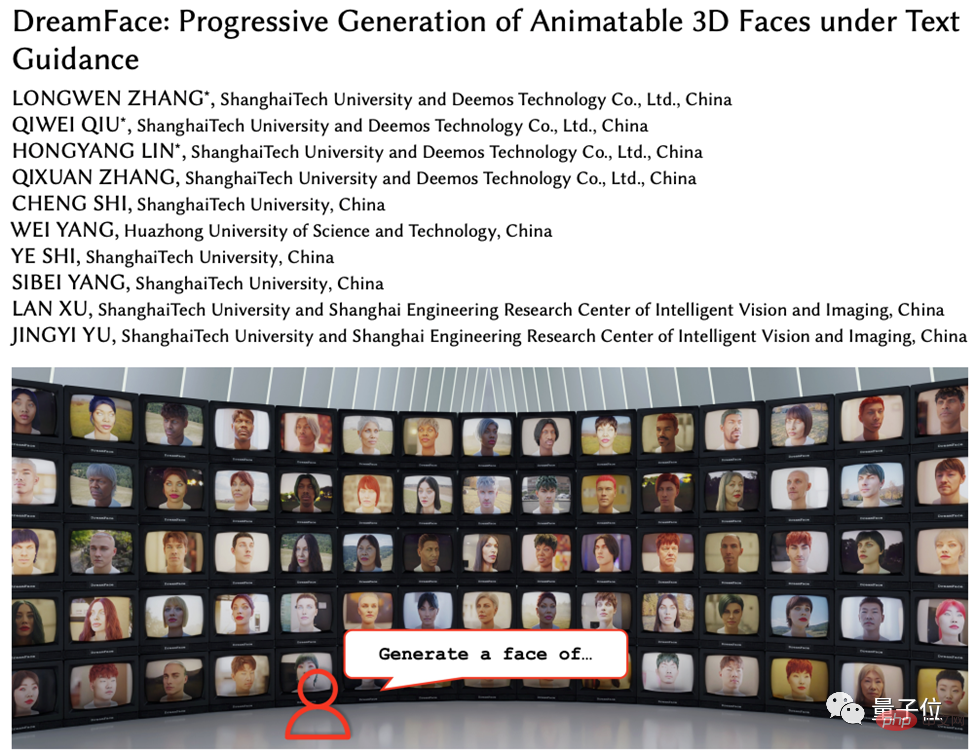
Project website: https://sites.google.com/view/dreamface
Preprint paper: https://arxiv.org/abs/2304.03117
Web Demo: https://hyperhuman.top
HuggingFace Space: https ://huggingface.co/spaces/DEEMOSTECH/ChatAvatar
How to implement the three major functions of DreamFace
DreamFace mainly includes three modules, geometry generation and physics-based materials Diffusion and animation capabilities are generated. Compared with previous 3D generation work, the main contributions of this work include:
- proposes DreamFace, a novel generation scheme that combines recent visual-language models with animatable and physically materialable faces Assets are combined to separate geometry, appearance and animation capabilities through progressive learning.
- Introduces the design of dual-channel appearance generation, combining a novel material diffusion model with a pre-trained model, while performing two-stage optimization in latent space and image space.
- Facial assets using BlendShapes or generated Personalized BlendShapes are animated and further demonstrate the use of DreamFace for natural character design.
Geometry generation: This module generates a geometric model based on text prompts through the CLIP (Contrastive Language-Image Pre-Training) selection framework.
First randomly sample candidates from the face geometric parameter space, and then select the rough geometric model with the highest matching score based on text prompts.
Next, implicit diffusion model (LDM) and Scored Distillation Sampling (SDS) processing are used to add facial details and detailed normal maps to the coarse geometry model to generate high-precision geometry.

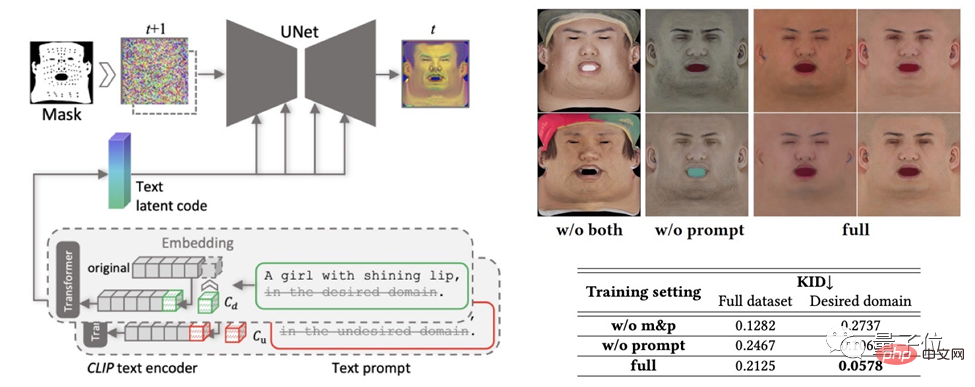
Physically Based Material Diffusion Generation: This module targets predicted geometry and text Tips for generating facial textures. First, the LDM is fine-tuned to obtain two diffusion models.
The two models are then coordinated through a joint training scheme, one for directly denoising U-texture maps and the other for supervised rendering of images. Additionally, a hint learning strategy and non-face area masking are employed to ensure the quality of the generated diffuse maps.
Finally, apply the super-resolution module to generate 4K physically-based textures for high-quality rendering.
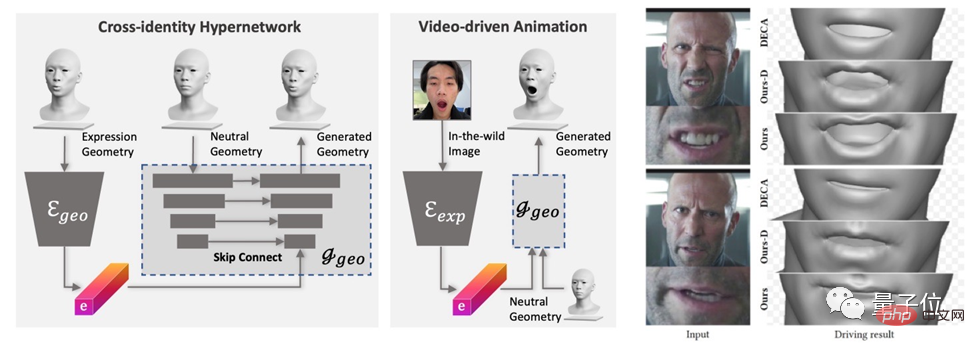
Animation capability generation: The model generated by DreamFace has animation capability. Different from traditional BlendShapes-based methods, this framework animates the Neutral model by predicting unique deformations to generate personalized animations.
The geometric generator is first trained to learn the expression latent space, and then the expression encoder is trained to extract expression features from RGB images. Finally, personalized animations are generated by using monocular RGB images.
Generate specified 3D assets in 5 minutes
The DreamFace framework has achieved good results in tasks such as celebrity generation and description generation characters, and has achieved results exceeding previous work in user evaluations.
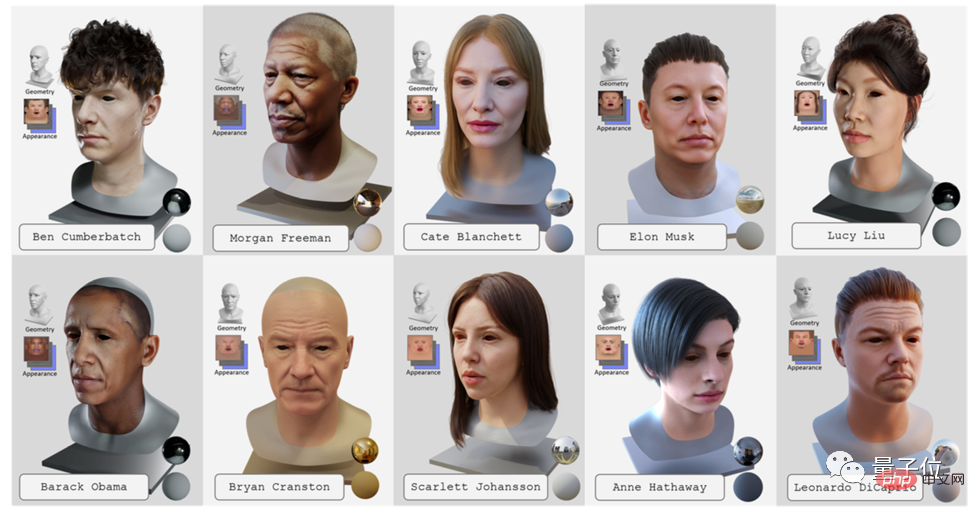
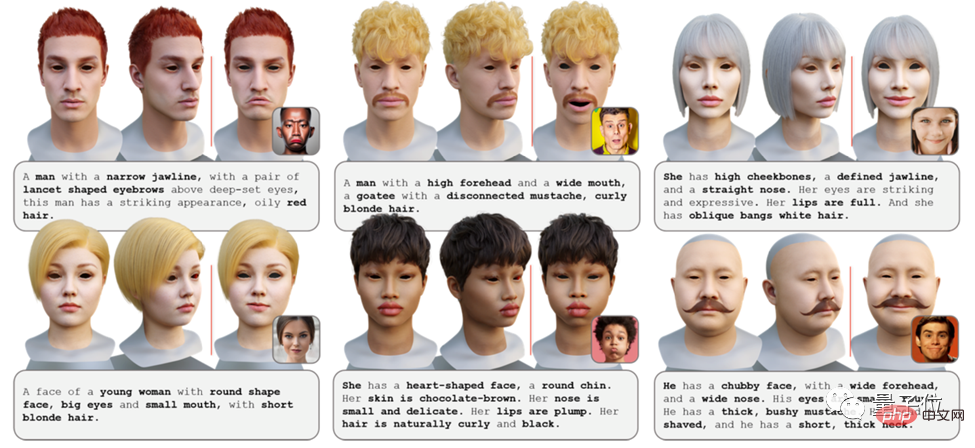
At the same time, compared with existing methods, it has obvious advantages in running time.
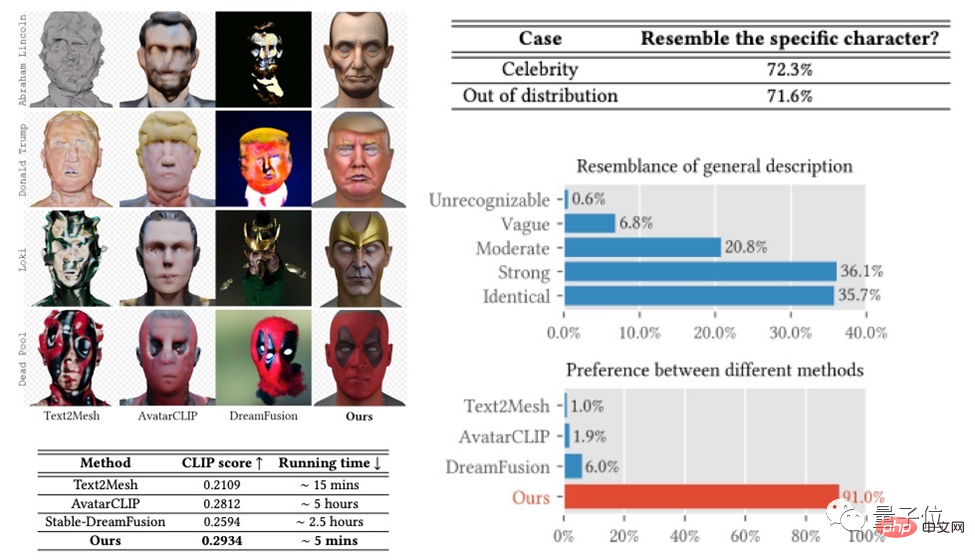
In addition, DreamFace supports texture editing using tips and sketches to achieve global editing effects (such as aging, makeup) and local editing effects (such as tattoos) , beard, birthmark).
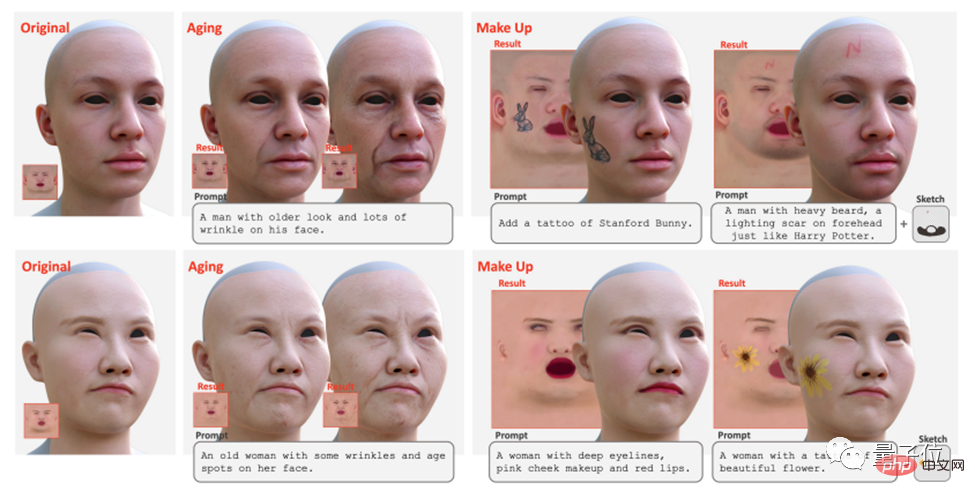
Can be used in film, television, games and other industries
As a text-guided progressive 3D generation framework, DreamFace combines visual -Language model, implicit diffusion model and physically based material diffusion technology achieve 3D generation with high precision, high efficiency and good compatibility.
This framework provides an effective solution for solving complex 3D generation tasks and is expected to promote more similar research and technology development.
In addition, physically based material diffusion generation and animation capability generation will promote the application of 3D generation technology in film and television production, game development and other related industries.
The above is the detailed content of Generate a Marvel 3D digital human in five minutes! The American Spider-Man and the Joker can all do it, and the facial details are restored in high definition.. For more information, please follow other related articles on the PHP Chinese website!

Hot AI Tools

Undresser.AI Undress
AI-powered app for creating realistic nude photos

AI Clothes Remover
Online AI tool for removing clothes from photos.

Undress AI Tool
Undress images for free

Clothoff.io
AI clothes remover

AI Hentai Generator
Generate AI Hentai for free.

Hot Article

Hot Tools

Notepad++7.3.1
Easy-to-use and free code editor

SublimeText3 Chinese version
Chinese version, very easy to use

Zend Studio 13.0.1
Powerful PHP integrated development environment

Dreamweaver CS6
Visual web development tools

SublimeText3 Mac version
God-level code editing software (SublimeText3)

Hot Topics
 1382
1382
 52
52
 Why is Gaussian Splatting so popular in autonomous driving that NeRF is starting to be abandoned?
Jan 17, 2024 pm 02:57 PM
Why is Gaussian Splatting so popular in autonomous driving that NeRF is starting to be abandoned?
Jan 17, 2024 pm 02:57 PM
Written above & the author’s personal understanding Three-dimensional Gaussiansplatting (3DGS) is a transformative technology that has emerged in the fields of explicit radiation fields and computer graphics in recent years. This innovative method is characterized by the use of millions of 3D Gaussians, which is very different from the neural radiation field (NeRF) method, which mainly uses an implicit coordinate-based model to map spatial coordinates to pixel values. With its explicit scene representation and differentiable rendering algorithms, 3DGS not only guarantees real-time rendering capabilities, but also introduces an unprecedented level of control and scene editing. This positions 3DGS as a potential game-changer for next-generation 3D reconstruction and representation. To this end, we provide a systematic overview of the latest developments and concerns in the field of 3DGS for the first time.
 Learn about 3D Fluent emojis in Microsoft Teams
Apr 24, 2023 pm 10:28 PM
Learn about 3D Fluent emojis in Microsoft Teams
Apr 24, 2023 pm 10:28 PM
You must remember, especially if you are a Teams user, that Microsoft added a new batch of 3DFluent emojis to its work-focused video conferencing app. After Microsoft announced 3D emojis for Teams and Windows last year, the process has actually seen more than 1,800 existing emojis updated for the platform. This big idea and the launch of the 3DFluent emoji update for Teams was first promoted via an official blog post. Latest Teams update brings FluentEmojis to the app Microsoft says the updated 1,800 emojis will be available to us every day
 Choose camera or lidar? A recent review on achieving robust 3D object detection
Jan 26, 2024 am 11:18 AM
Choose camera or lidar? A recent review on achieving robust 3D object detection
Jan 26, 2024 am 11:18 AM
0.Written in front&& Personal understanding that autonomous driving systems rely on advanced perception, decision-making and control technologies, by using various sensors (such as cameras, lidar, radar, etc.) to perceive the surrounding environment, and using algorithms and models for real-time analysis and decision-making. This enables vehicles to recognize road signs, detect and track other vehicles, predict pedestrian behavior, etc., thereby safely operating and adapting to complex traffic environments. This technology is currently attracting widespread attention and is considered an important development area in the future of transportation. one. But what makes autonomous driving difficult is figuring out how to make the car understand what's going on around it. This requires that the three-dimensional object detection algorithm in the autonomous driving system can accurately perceive and describe objects in the surrounding environment, including their locations,
 CLIP-BEVFormer: Explicitly supervise the BEVFormer structure to improve long-tail detection performance
Mar 26, 2024 pm 12:41 PM
CLIP-BEVFormer: Explicitly supervise the BEVFormer structure to improve long-tail detection performance
Mar 26, 2024 pm 12:41 PM
Written above & the author’s personal understanding: At present, in the entire autonomous driving system, the perception module plays a vital role. The autonomous vehicle driving on the road can only obtain accurate perception results through the perception module. The downstream regulation and control module in the autonomous driving system makes timely and correct judgments and behavioral decisions. Currently, cars with autonomous driving functions are usually equipped with a variety of data information sensors including surround-view camera sensors, lidar sensors, and millimeter-wave radar sensors to collect information in different modalities to achieve accurate perception tasks. The BEV perception algorithm based on pure vision is favored by the industry because of its low hardware cost and easy deployment, and its output results can be easily applied to various downstream tasks.
 Paint 3D in Windows 11: Download, Installation, and Usage Guide
Apr 26, 2023 am 11:28 AM
Paint 3D in Windows 11: Download, Installation, and Usage Guide
Apr 26, 2023 am 11:28 AM
When the gossip started spreading that the new Windows 11 was in development, every Microsoft user was curious about how the new operating system would look like and what it would bring. After speculation, Windows 11 is here. The operating system comes with new design and functional changes. In addition to some additions, it comes with feature deprecations and removals. One of the features that doesn't exist in Windows 11 is Paint3D. While it still offers classic Paint, which is good for drawers, doodlers, and doodlers, it abandons Paint3D, which offers extra features ideal for 3D creators. If you are looking for some extra features, we recommend Autodesk Maya as the best 3D design software. like
 Get a virtual 3D wife in 30 seconds with a single card! Text to 3D generates a high-precision digital human with clear pore details, seamlessly connecting with Maya, Unity and other production tools
May 23, 2023 pm 02:34 PM
Get a virtual 3D wife in 30 seconds with a single card! Text to 3D generates a high-precision digital human with clear pore details, seamlessly connecting with Maya, Unity and other production tools
May 23, 2023 pm 02:34 PM
ChatGPT has injected a dose of chicken blood into the AI industry, and everything that was once unthinkable has become basic practice today. Text-to-3D, which continues to advance, is regarded as the next hotspot in the AIGC field after Diffusion (images) and GPT (text), and has received unprecedented attention. No, a product called ChatAvatar has been put into low-key public beta, quickly garnering over 700,000 views and attention, and was featured on Spacesoftheweek. △ChatAvatar will also support Imageto3D technology that generates 3D stylized characters from AI-generated single-perspective/multi-perspective original paintings. The 3D model generated by the current beta version has received widespread attention.
 An in-depth interpretation of the 3D visual perception algorithm for autonomous driving
Jun 02, 2023 pm 03:42 PM
An in-depth interpretation of the 3D visual perception algorithm for autonomous driving
Jun 02, 2023 pm 03:42 PM
For autonomous driving applications, it is ultimately necessary to perceive 3D scenes. The reason is simple. A vehicle cannot drive based on the perception results obtained from an image. Even a human driver cannot drive based on an image. Because the distance of objects and the depth information of the scene cannot be reflected in the 2D perception results, this information is the key for the autonomous driving system to make correct judgments on the surrounding environment. Generally speaking, the visual sensors (such as cameras) of autonomous vehicles are installed above the vehicle body or on the rearview mirror inside the vehicle. No matter where it is, what the camera gets is the projection of the real world in the perspective view (PerspectiveView) (world coordinate system to image coordinate system). This view is very similar to the human visual system,
 The latest from Oxford University! Mickey: 2D image matching in 3D SOTA! (CVPR\'24)
Apr 23, 2024 pm 01:20 PM
The latest from Oxford University! Mickey: 2D image matching in 3D SOTA! (CVPR\'24)
Apr 23, 2024 pm 01:20 PM
Project link written in front: https://nianticlabs.github.io/mickey/ Given two pictures, the camera pose between them can be estimated by establishing the correspondence between the pictures. Typically, these correspondences are 2D to 2D, and our estimated poses are scale-indeterminate. Some applications, such as instant augmented reality anytime, anywhere, require pose estimation of scale metrics, so they rely on external depth estimators to recover scale. This paper proposes MicKey, a keypoint matching process capable of predicting metric correspondences in 3D camera space. By learning 3D coordinate matching across images, we are able to infer metric relative



